Know the dangers before you buy one
You can trust a third-party cable for charging your iOS device, but there’s a caveat. Charging your iOS device with a non-Apple brand cable can damage it. That said, if the cable is labeled “Made for iPhone/iPad/iPod”, and is from a trusted company, then you’re safe.
Unofficial Apple cables come at a much lower price than the original, certified Apple cable. After all, most people would jump at the chance to make a saving now and then.
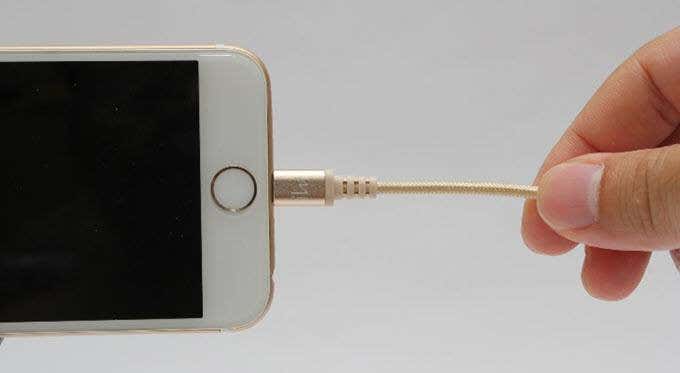
These cables, particularly the cheap knockoff type, lack safety mechanisms in the internal circuitry. Eventually, they cause problems like diminished battery life, spontaneous device combustion, damaged charging chip, or worse still, a mangled motherboard.
When you connect such a cable, your iOS device will notify you that you’re using an unofficial or uncertified cable and it may not work as expected with your device. Sometimes these messages can appear incorrectly, owing to a damaged or broken cable, or a one-time bug.
Is My Third-Party Lightning Cable Certified?
Apple has made it easier for iOS users to know which cable is certified and which one isn’t through its MFi program (Made For iPhone/iPad/iPod). Genuine Apple Lightning cables come with certain text, serial numbers, and the MFi logo printed on them or their packaging.
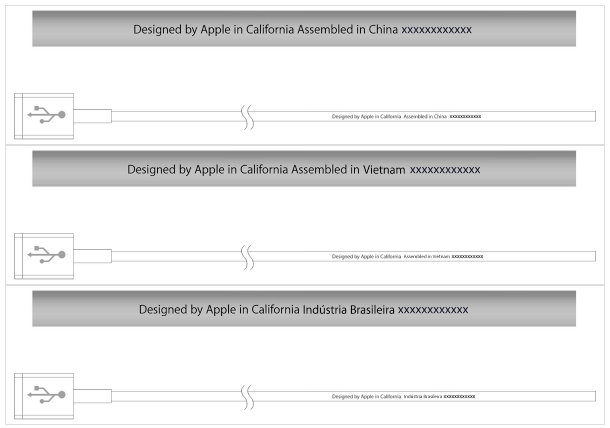
Similarly, iPhones and iPads can automatically detect unofficial Lightning cables, thanks to the presence of an authentication chip embedded in the original cable.
This is probably Apple’s way of stopping manufacturers from developing uncertified versions of their proprietary connector. Does this work? Yes and no.
Some manufacturers claim to have bypassed the chip and built connectors that work with Apple devices. That may have worked with iOS 6, but with the arrival of iOS 7, users receive warnings whenever such uncertified connectors are used.
You should note though that Apple’s warranty doesn’t cover damages caused by using third-party products that aren’t certified under its MFi program.
All is not lost though. You can get an Apple MFi certified third-party cable that’s compatible with your device if you don’t want to spend $20 on the original Apple cable.
Best Third-Party Cables For Charging Your iOS Device
Whether you need a super short or extra-long cord, here are four of the best MFi-certified, third-party Lightning cables you can get for your iOS device.
Anker PowerLine+ Lightning Cable
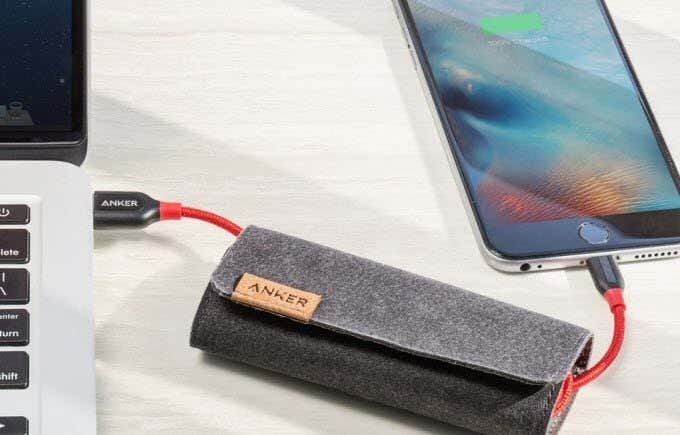
The Anker PowerLine brand is by far one of the strongest lightning cables available. This particular one has a durable design and an impressive six-foot-long cord.
Its exterior is made of double-braided nylon, and at its core is a toughened Kevlar fiber with laser-welded connectors for superior toughness. The cable has been tested with a 6,000-plus bend lifespan and does a great job delivering quick charge to iOS devices, sometimes even faster than Apple’s standard cable.
You can get it in four different colors: gray, white, red, and golden, inclusive of an 18-month warranty, customer service, and an adjustable pouch to adjust it neatly and protect it on the go.
Pros
- MFi-certified
- Compatible with most iOS devices
- Reputable brand
- Durable
- Eye-catching design and colors
- Adjustable pouch available
Cons
- Some users reported occasional compatibility issues
- Feels a little pricey
- Prone to tangles
- Snaggy texture
Syncwire iPhone Charger Lightning Cable
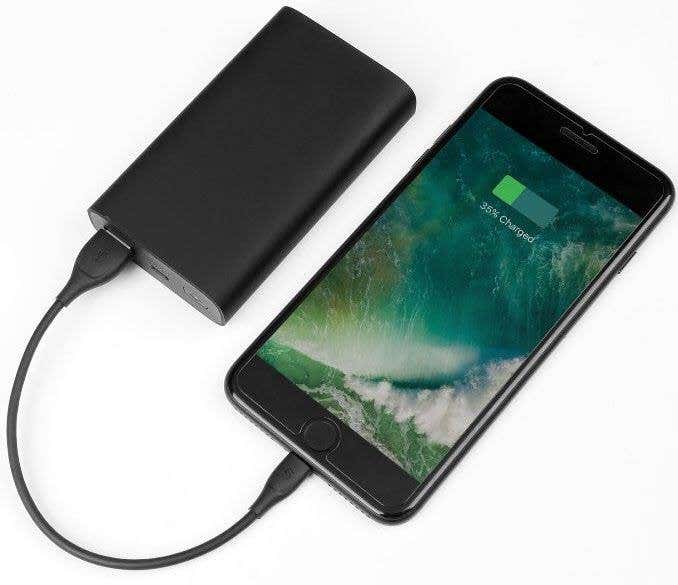
This lightning cable works with most iOS devices, including a few older models.
It boasts a high level of resilience and top-notch durability and claims to be able to withstand over 200 rounds of pressure and up to 30,000 rounds of 90-degree bends. Its core is built with polyethylene hybrid and aramid fiber, and the exterior has an original eight-pin connector for charging, high-speed data transfer, and syncing.
You can fit it easily into an iPhone case thanks to its slim, ergonomic design, and use it outdoors without worrying that it’ll get damaged.
Pros
- MFi-certified
- Top-notch durability
- Sleek design
- Affordable
Cons
- Short length
- No extra features
AmazonBasics Apple Certified Lightning to USB Cable
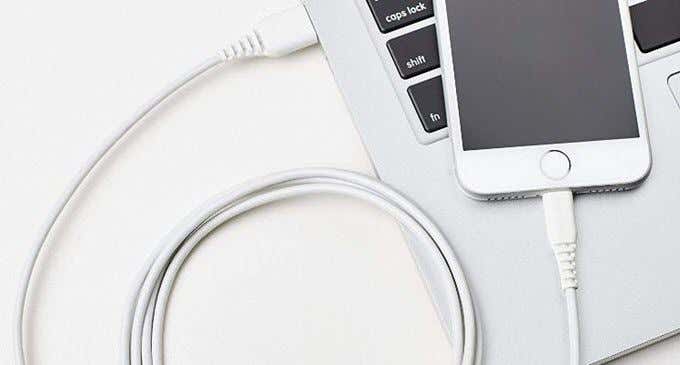
This Apple MFi-certified cable comes in four different lengths from four inches, to as long as ten feet. It’s compatible with all iOS devices, going all the way back to fifth-generation models.
Its simple design features a compact lightning connector head with an extra layer of protection on both ends that improves its durability and reduces fraying. It can withstand more than 4,000 times of 95-degree bends.
Compared to our top two picks, the AmazonBasics cable is reasonably priced and comes in a variety of vibrant color options, plus a one-year limited warranty in case of breakage.
Pros
- MFi-certified
- Durable
- Reasonably priced
- Vibrant color options
- Compatible with all iOS devices
Cons
- Feels cheaper than it is
Anker PowerLine II Lightning Cable
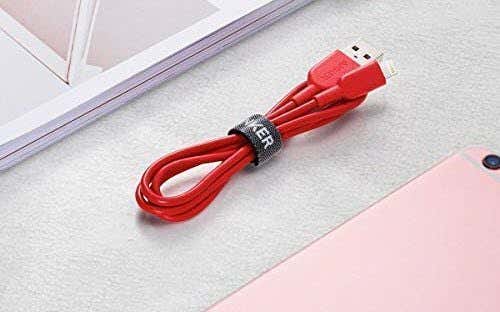
This MFi-certified cable offers solid durability and can withstand more than 12,000 bends, accidental tugs, and tangles without getting worn out. It also comes in various color options, plus a cable tie for storage or travel.
It’s shorter than other cables mentioned here, plus it has a rigid feel especially when coiling it up, which can be a bit unpleasant. That said, it comes with a lifetime warranty and its connectors feature an ergonomic design that ensures you get the fastest data transfer and charging speeds.
Pros
- Solid durability
- Various color options
- Fast charging and data transfer
Cons
- Rugged, rigid feel
- Short length
How To Select a Third-Party Cable For Your iOS Device
One of the major differences between the original Apple connector and third-party options – besides price and presence of the authentication chip – is its narrow base. Third-party cables have a broader base because manufacturers haven’t been able to reproduce the technology and design of the original.
If you’re buying from an Apple reseller store, make sure you test whether it’s compatible with your device or not; you can ask for a demo if one is available.
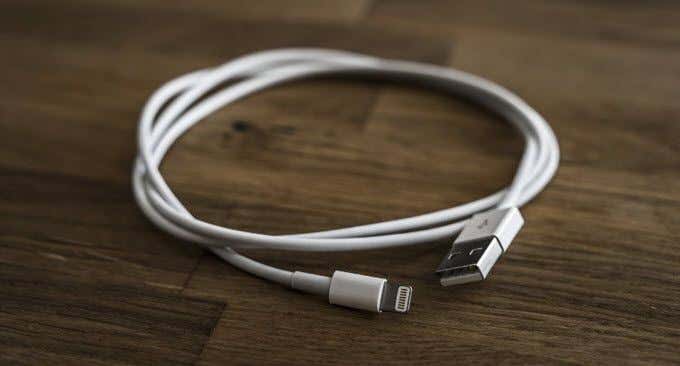
We don’t recommend buying one online though, as you could end up with a cable that’s incompatible with your device. Some online stores advertise cheap connectors that end up being unreliable and a waste of money.
We hope you now know the dangers of using a non-Apple brand cable with your iOS device. You can pick one from the four mentioned above, but remember to test with your device before paying for it.





